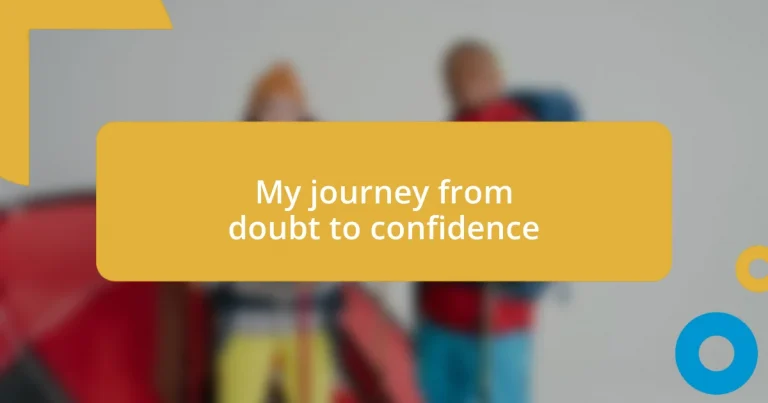Key takeaways:
- Self-doubt often arises from comparison and past experiences; recognizing triggers is crucial for managing it effectively.
- Building self-confidence involves setting small, achievable goals, practicing self-compassion, and surrounding oneself with supportive people.
- Embracing failure as a learning opportunity and maintaining a positive mindset through reflective practices can significantly enhance personal growth and confidence.
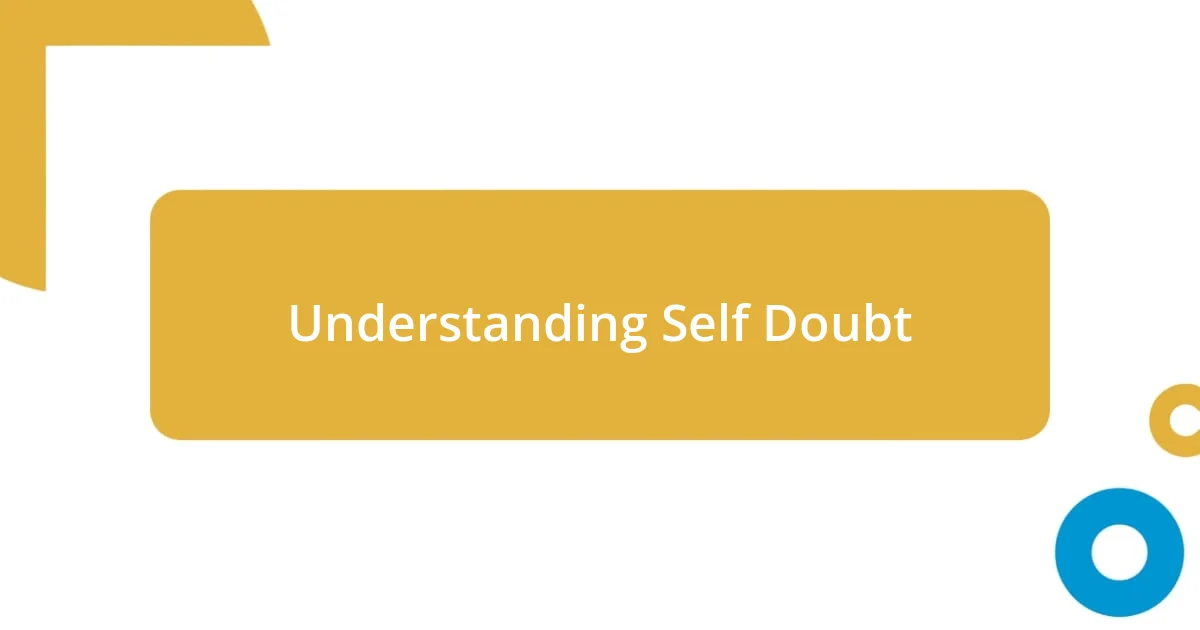
Understanding Self Doubt
Self-doubt can be a sneaky little emotion that creeps into our minds when we least expect it. I remember a time when I hesitated to share my ideas in meetings, convinced that others would find them meaningless. Have you ever felt that nagging question, “What if I’m not good enough?” It’s a common sentiment, yet it can be paralyzing.
One of the most intriguing things about self-doubt is how it often stems from comparison. For instance, scrolling through social media, I would see others thriving, while I struggled to take the first step. This cycle of comparison can distort our perception of ourselves and amplify our insecurities. Have you noticed how easily we forget to recognize our individual journey amidst the noise of others’ successes?
Understanding self-doubt is like peering into a mirror that reflects our fears and vulnerabilities. When I started to embrace these feelings instead of running from them, I found they could be catalysts for growth. Have you ever considered that perhaps your self-doubt might reveal opportunities to learn and evolve? Seeing it that way can transform how we engage with ourselves, shifting from negative self-talk to a more nurturing dialogue.
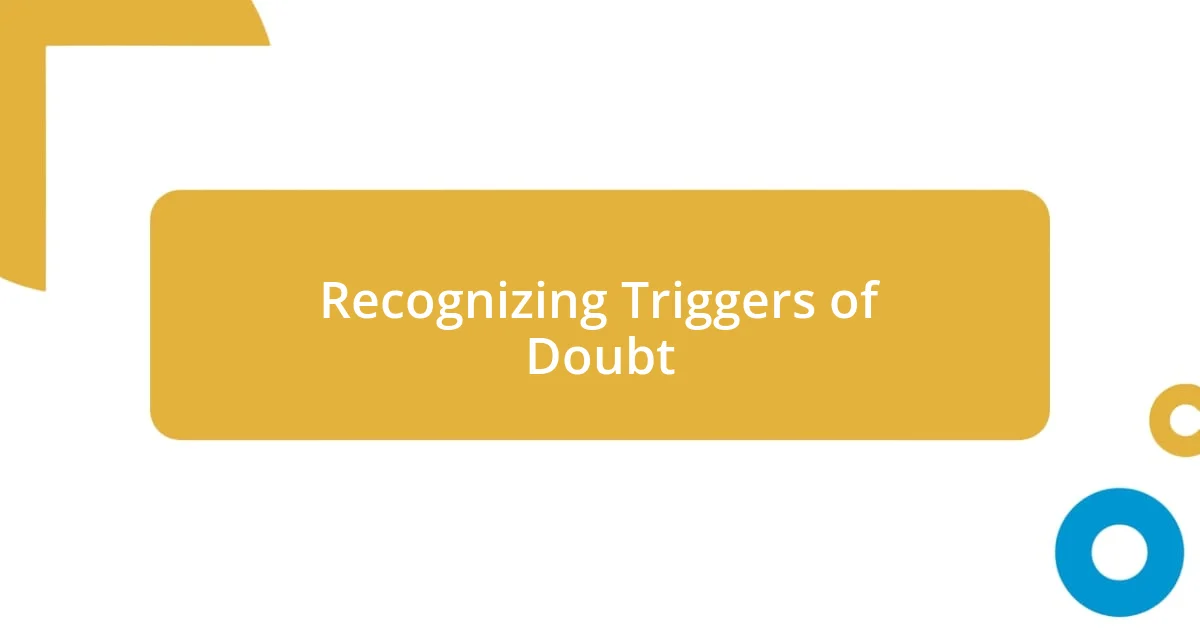
Recognizing Triggers of Doubt
Recognizing the triggers of self-doubt is crucial for managing it effectively. I often find that my doubts emerge during moments of transition or challenge. For instance, I remember a time when I was preparing for a big presentation. The thought of potentially failing made me second-guess not only my skills but also my worth. It’s fascinating how specific situations can unearth feelings I’ve tucked away, often leading to a cycle of uncertainty that’s difficult to break.
Here are some common triggers I’ve identified in my journey:
- Comparison: Seeing others’ achievements can lead me to question my abilities.
- Past Failures: Reflecting on previous mistakes can create a snowball effect of self-doubt.
- Criticism: Negative feedback, whether constructive or not, can deeply affect my confidence levels.
- High Expectations: When I set the bar too high, I often feel overwhelmed and anxious about meeting those standards.
- Isolation: Lack of support or connection can amplify feelings of inadequacy.
Whenever I notice these triggers, I try to pause and reflect on their origins. It’s that moment of awareness that allows me to differentiate between genuine concern and unfounded doubts.
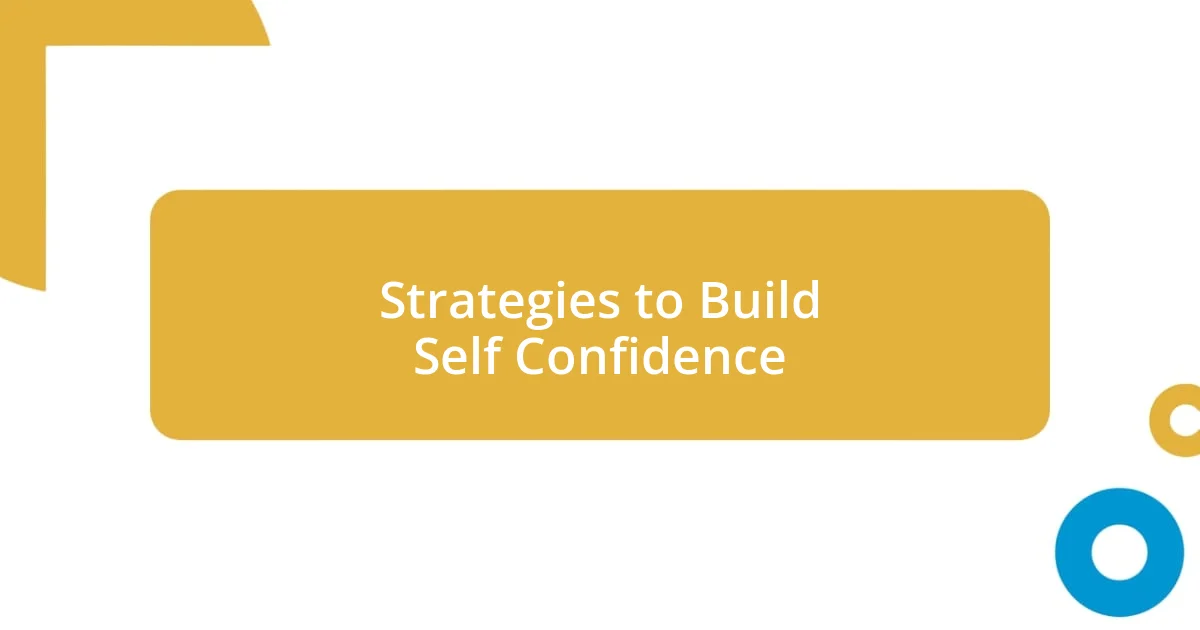
Strategies to Build Self Confidence
Building self-confidence is a transformative journey, and there are specific strategies that have been pivotal for me. One effective method is setting small, achievable goals. For example, I started by committing to share one idea in each meeting. Over time, as I fulfilled these little promises, my confidence bloomed. Have you ever experienced the rush of accomplishment from a seemingly small victory? It’s those tiny steps that create a solid foundation for greater achievements.
Another strategy that I hold dear is practicing self-compassion. Whenever I face setbacks, I remind myself that every mistake is an opportunity to learn, not a reflection of my worth. I vividly recall a time when I mismanaged a project at work. Instead of wallowing in disappointment, I took a step back and asked myself what I could improve next time. Embracing my imperfections and treating myself with kindness has helped me to bounce back quicker than I could have imagined.
Lastly, surrounding yourself with positive influences can significantly enhance your confidence. Reflecting on my experiences, I sought out mentors and friends who lifted me up. Their encouragement provided a safe space for me to express my ideas without the fear of judgment. Have you considered the impact of your social circle on your self-esteem? A supportive network can make all the difference in how you perceive yourself and your abilities.
| Strategy | Description |
|---|---|
| Set Small Goals | Start with simple tasks to build momentum and success. |
| Practice Self-Compassion | Learn to treat yourself kindly during setbacks and mistakes. |
| Surround Yourself with Positivity | Choose supportive people who encourage your growth and confidence. |
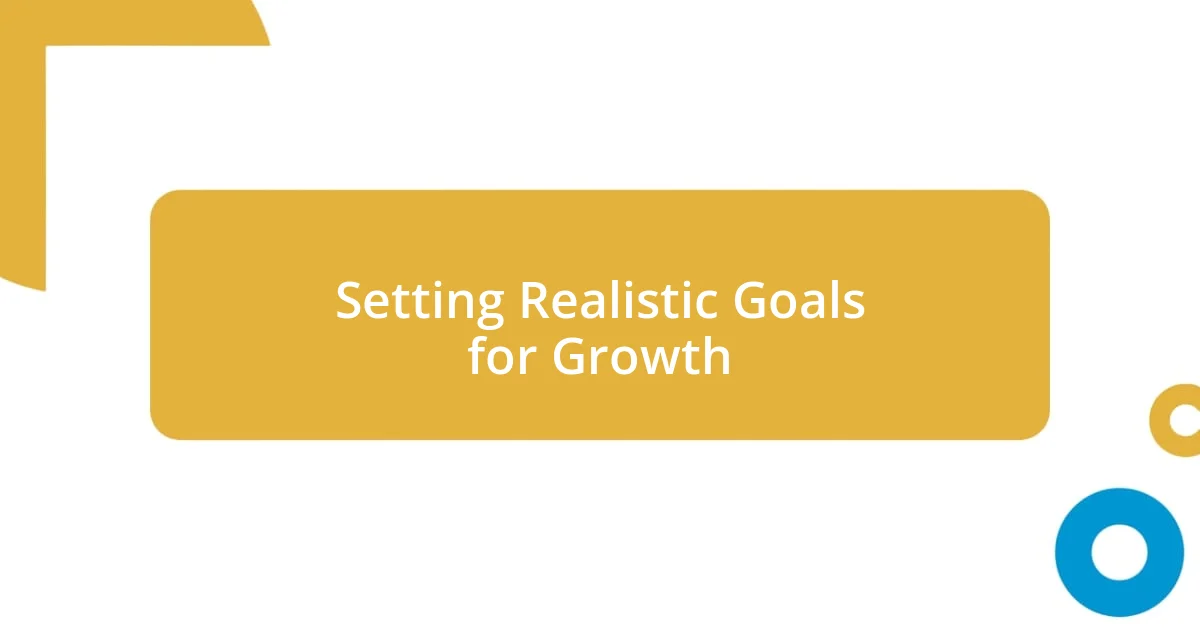
Setting Realistic Goals for Growth
Setting realistic goals is essential for personal growth, and I’ve found that clarity is key. When I began my journey, I often set ambitious goals that felt almost unattainable. One time, I aimed to read an entire book every week, only to feel defeated when life got in the way. By adjusting my goal to just a chapter a day, I not only completed that book but also fostered a consistent reading habit. Isn’t it fascinating how small adjustments can lead to significant progress?
Another insight I’d like to share is the importance of milestone markers. Rather than focusing solely on the end result, I created mini-goals within larger objectives. For instance, when working toward a career certification, I celebrated each completed study module. These little wins kept me motivated and reminded me of how far I’d come. Have you thought about how celebrating small victories could shift your perspective on progress?
I also believe it’s vital to remain flexible with your goals. Life is unpredictable, and I’ve learned to adapt when circumstances change. I remember planning to run a 10K, but an ankle injury forced me to adjust my timeline. Instead of feeling defeated, I shifted to a walking regimen, which kept me active and engaged without pushing through pain. How might you adapt your goals to better fit your current situation? Embracing flexibility can turn potential setbacks into opportunities for growth.
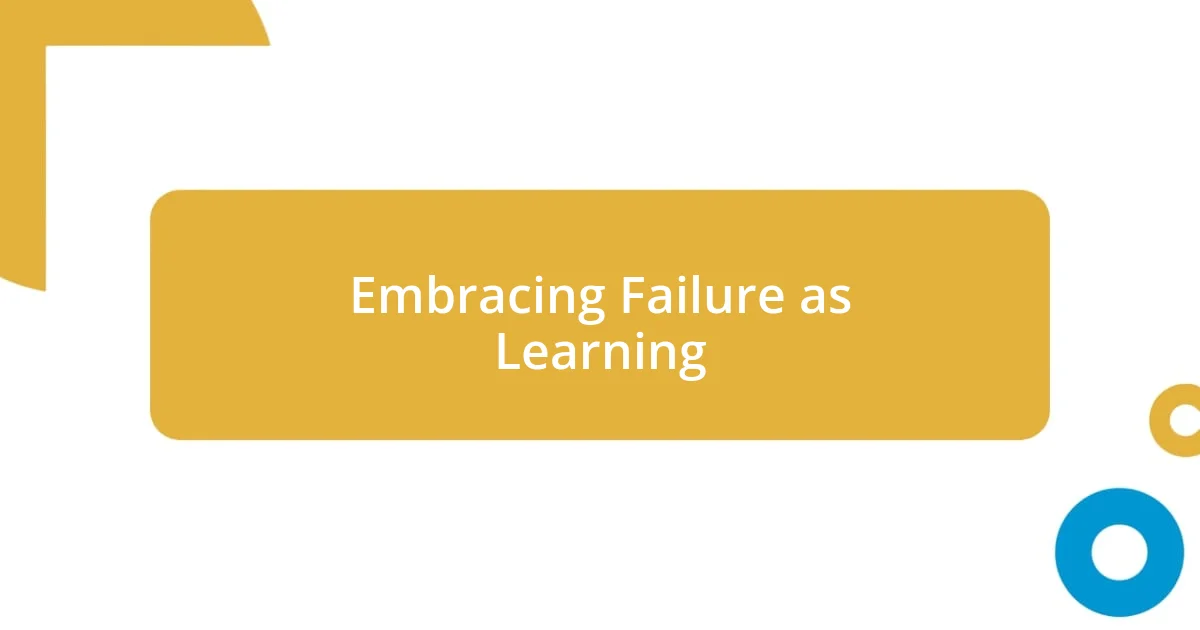
Embracing Failure as Learning
Embracing failure has been one of the most enlightening aspects of my journey. I remember the first time I led a project that ultimately fell short of expectations. Instead of feeling defeated, I took the time to analyze what went wrong. That experience taught me invaluable lessons about planning, communication, and adaptability. Isn’t it interesting how sometimes our biggest setbacks can turn into our greatest teachers?
I often remind myself that every failed attempt carries a hidden lesson. For example, when I attempted to start a blog, my writing felt clumsy, and I received critical feedback. Initially, it stung, and I thought about giving up. But then, I decided to view it as an opportunity for improvement. I enrolled in a writing course, practiced diligently, and gradually found my voice. Looking back, I see that criticism shaped me, not just as a writer, but as a person ready to embrace growth.
There’s a profound sense of freedom that comes with reframing failure as feedback. I’ve learned to approach challenges with a curious mindset rather than one of fear. Instead of asking, “What if I fail?” I now ask, “What can I learn from this experience?” This shift has allowed me to take greater risks, knowing that each stumble is merely a stepping stone towards my goals. How do you perceive your failures? Is there a way you could turn them into opportunities for personal growth?
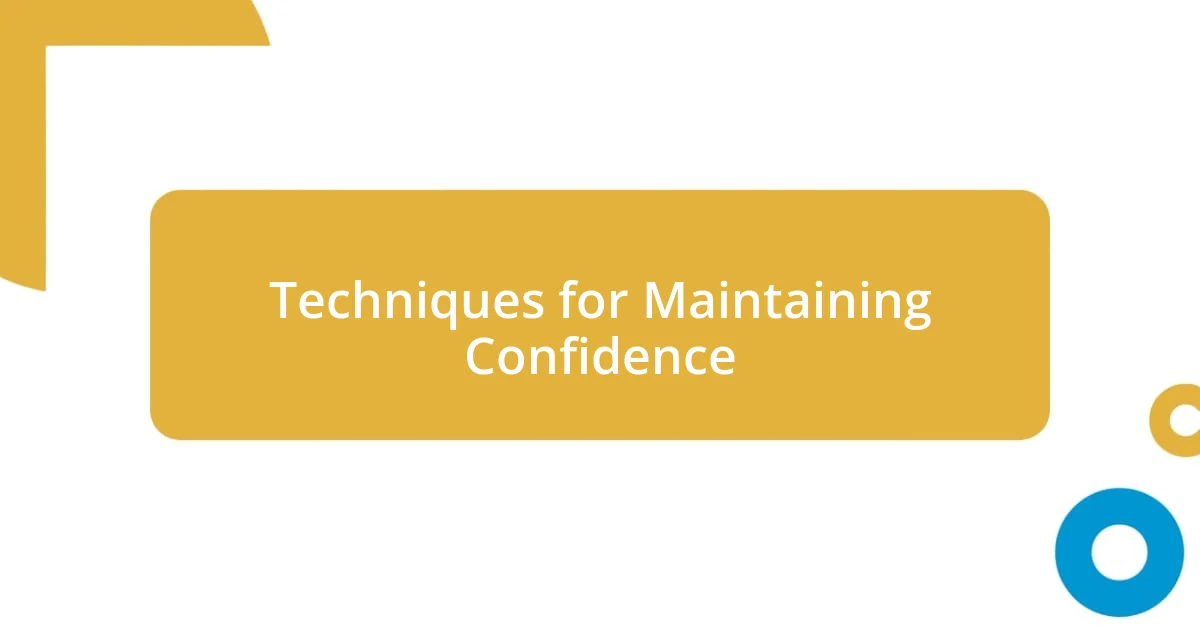
Techniques for Maintaining Confidence
Maintaining confidence often comes down to nurturing a positive mindset. I’ve found that daily affirmations can be incredibly powerful. Each morning, I look in the mirror and remind myself of my strengths and achievements. It may sound cliché, but the act of vocalizing those affirmations helps ground me, especially on days when self-doubt creeps in. Have you ever tried speaking positively to yourself? You might be surprised by how it transforms your outlook.
Another technique I swear by is surrounding myself with supportive people. When I share my goals and challenges with family and friends who uplift me, I feel empowered to take on obstacles. There was a time when I hesitated to speak in public until a close friend encouraged me to join a local speaking group. Their belief in me sparked a fire of confidence I didn’t know I had. Who are the cheerleaders in your life that can help reinforce your self-belief?
Finally, reflection plays a crucial role in keeping my confidence intact. I regularly journal about my experiences, both successes and setbacks. This practice has turned into a safe space where I can express my thoughts freely. Recently, I reread some older entries and was amazed at how far I’ve come. It made me realize that every challenge I’ve faced has contributed to my growth. Do you take time to reflect on your journey? It can be an enlightening experience that boosts your confidence even more.
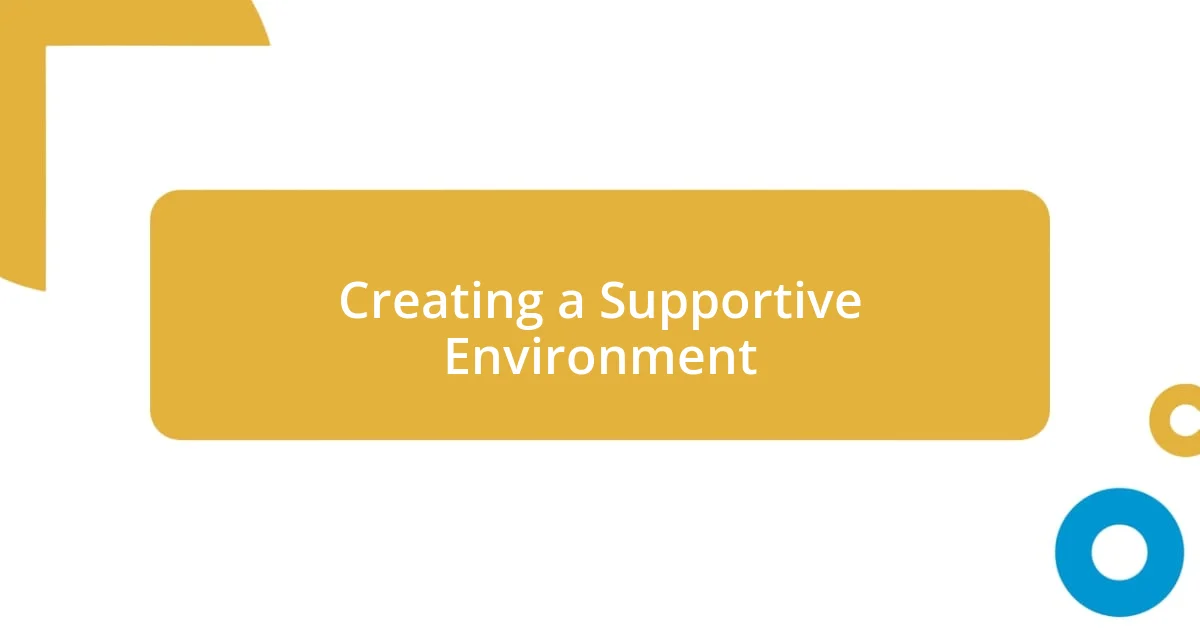
Creating a Supportive Environment
Creating a supportive environment is essential to building confidence. I’ve experienced firsthand the impact of surrounding myself with positive influences. I recall a time when I was preparing for a big presentation at work, and a colleague offered to practice with me. Their encouragement and constructive feedback not only bolstered my confidence but also turned what could’ve been a nerve-wracking experience into an enjoyable collaboration. Have you felt the difference when someone genuinely believes in you?
Moreover, establishing a nurturing space isn’t just about other people; it also involves setting boundaries. I learned that it’s perfectly okay to distance myself from negative influences. There was a time when I held onto friendships that drained my energy instead of uplifting it. By gradually focusing my energy on relationships that added value, I noticed a shift in my mindset. Can you think of relationships in your life that make you feel energized rather than exhausted?
Creating a supportive environment also means prioritizing self-compassion. I remember a particularly difficult week where nothing seemed to go right. Instead of berating myself, I took a moment to breathe and acknowledge my feelings. I found that giving myself grace allowed me to refocus and regain the motivation to tackle my problems. How do you treat yourself during challenging moments? A little kindness to ourselves can lead to profound growth and a more uplifting environment.












